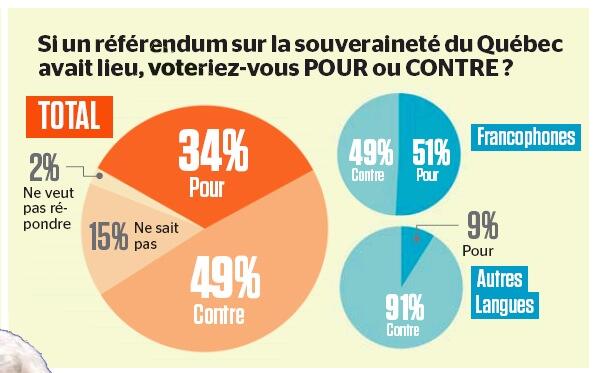Paul Wells points out some interesting facts about the political situation in Quebec and sums it up as “and then a referendum ate them all”:
2. In 2007 the PQ ran on a relatively mild version of its traditional calling card, nationalism, and a now-vanished party, the ADQ, ran on what might politely be termed populist nativism. Together they held Jean Charest’s Liberals to a minority, but if a single party could combine nationalism and nativism, it might box the Liberals in more completely than two could. That’s the calculation Jean-François Lisée made, and first as Marois’s counsellor and then as a rookie MNA and senior cabinet minister, he has encouraged the PQ’s transformation into a party with much of the appeal those two parties had in 2007. The rest of Quebec politics, and especially, the Liberals, have had 8 years to prepare for the play the Marois-Lisée PQ is making, without much success. All elections are unpredictable and Quebec has been surprising in many ways lately, but I’d bet a loonie (though not a penny more) that the PQ wins a majority.
[…]
4. Will she hold a secession referendum? If I were Lisée, I would tell her this: PQ premiers who didn’t hold referendums are not remembered fondly today. Pierre Marc Johnson, Bouchard, Landry. The two who did are heroes of the movement, even though they lost: René Lévesque and Parizeau. To which group would Marois rather belong?
5. In a referendum, political Canada would be represented by a No committee leader, Couillard, who would have just lost an election; a federal prime minister, Stephen Harper, whose party is far less popular in Quebec than Jean Chrétien’s Liberals ever were; and by a reasonably impressive B team (Thomas Mulcair and Justin Trudeau) whose members cannot conceivably work effectively with one another.
Update: David Akin says “That’s some franco/non-franco split on the referendum question:”




